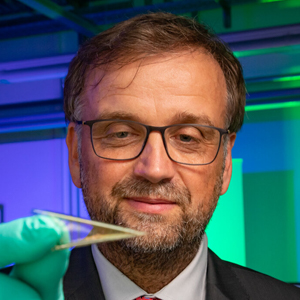
Professor of Material Systems for Nanoelectronics Chemnitz University of Technology, Germany
Oliver G. Schmidt is the Scientific Director of the Research Center for Materials, Architectures and Integration of Nanomembranes (MAIN) and holds the Chair of Material Systems for Nanoelectronics at the Chemnitz University of Technology, Germany. He is adjunct Professor of Nanophysics at the Dresden University of Technology, Germany as well as Honorary Professor and Founding Director of the International Institute for Intelligent Nanorobotics and Nanosystems at Fudan University in Shanghai, China. He is an elected member of the German Academy of Science and Engineering and has received several awards: The Otto-Hahn Medal from the Max-Planck-Society in 2000, the Philip-Morris Research Award in 2002 and the Carus-Medal from the German Academy of Natural Scientists Leopoldina in 2005. In 2013 he was awarded the International Dresden Barkhausen Award, in 2018 he received the Gottfried Wilhelm Leibniz-Prize of the German Research Foundation, in 2019 he was awarded an Advanced Grant of the European Research Council (ERC) and in 2021 he received the Leibniz Medal of the Leibniz Institute for Solid State and Materials Research. He is an ISI Highly Cited Researcher (2018, 2019, 2022) with an H-Index of 123. His professional activities bridge across several research disciplines, ranging from small scale robotics and energy storage devices to flexible electronics and biomedical applications.
Microrobots: From Single Agents To Microelectronic Morphogenesis
Abstract
This talk addresses some of the key challenges in the field of microrobotics [1]. For instance, by controlling the robots’ materials elasticity with nanscale precision by confocal photolithographic manufacturing of a novel magnetically active material, cell-sized picoforce springs with remarkably large and tuneable compliancy can be fabricated – allowing articulated motion in microrobots as well as micromanipulations and force sensing well beyond state of the art [2]. The storage and delivery of energy for truly autonomous operation of microrobotic systems represents another key challenge in the field [3] and will be addressed by producing world’s tiniest on-board integrated batteries and biosupercapacitors [4,5]. The ability to create compact microelectronic robots leads us to the concept of microelectronic morphogenesis (MIMO) [6]. MIMO is the creation of form and structure under microelectronic control, and relies on our previous work on self-folding [7] and self-locomoting [8] thin film electronic modules, now carrying tiny silicon chiplets between the folds, for a massive increase in information processing capabilities.
1. M. Medina-Sánchez, O. G. Schmidt, Nature 545, 406 (2017)
2. H. Xu, S. Wu, Y. Liu, X. Wang, A. K. Efremov, L. Wang, J. S. McCaskill, M. Medina-Sánchez, O. G. Schmidt, Nature Nanotechnol. (2024) https://doi.org/10.1038/s41565-023-01567-0.
3. M. Zhu, O. G. Schmidt, Nature 589, 195 (2021)
4. Y. Li, M. Zhu, V. K. Bandari, D. D. Karnaushenko, D. Karnaushenko, F. Zhu, O. G. Schmidt, Adv. Energy Mater. 12, 2103641 (2022)
5. Y. Lee, V. K. Bandari, Z. Li, M. Medina-Sanchez, M. F. Maitz, D. Karnaushenko, M. V. Tsurkan, D. D. Karnaushenko, O. G. Schmidt, Nature Comm. 12, 4967 (2021)
6. J. S. McCaskill, D. Karnaushenko, M. Zhu, O. G. Schmidt, Adv. Mater. 35, 2306344 (2023)
7. C. Becker, B. Bao, D. D. Karnaushenko, V. K. Bandari, B. Rivkin, Z. Li, M. Faghih, D. Karnaushenko, O. G. Schmidt, Nature Comm. 13, 2121 (2022)
8. V. K. Bandari, Y. Nan, D. Karnaushenko, Y. Hong, B. Sun, F. Striggow, D. D. Karnaushenko, C. Becker, M. Faghih, M. Medina-Sanchez, F. Zhu, O. G. Schmidt, Nature Electron. 3, 172 (2020).
